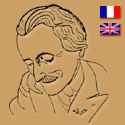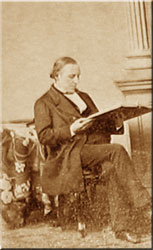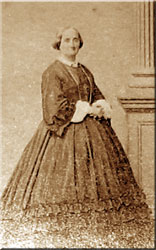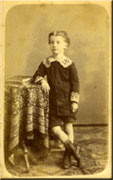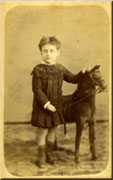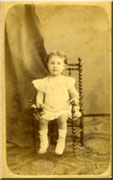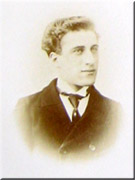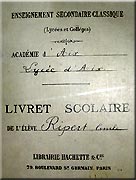![]()
Genealogy
| 1806-1882 | 1883-1904 | 1905-1919 | 1920-19 .. |
It was in La Ciotat that Émile Ripert was born on November 19, 1882.
 |
| Émile RIPERT’s paternal family comes from Cadenet in the Vaucluse.
His paternal grandfather Adolphe RIPERT was a notary in this small country around 1850. He then created a silk mill. But he was also a happy maintainerand friend of Mistral. |
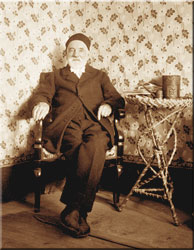 Adolphe RIPERT 1815-1909 |
He was winner of the Provençal language competitions.
He edited the works of R.P. Garnier and translated into Provencal language the Imitation of Jesus Christ that Mistral deposited at the Arlatin Museum. It is in memory of this paternal grandfather that Émile dedicated his work “La Renaissance Provençale”. |
|
|
His maternal grandfather Addo Martin Berenger was also a notary in La Ciotat and he was also a poet. He had learned Latin and he liked to exchange verses in Latin with his friends from Ciotad. He also sang the joys of the family in French verse in the manner of Lamartine. He left voluminous notebooks of French verse which reveal a very skilful versifier nourished by Latin culture. Deputy mayor, he amused himself by bringing up municipal quarrels.
He had married Élise PAYAN, from a very old family in La Ciotat. They had two daughters Elvire and Mélanie. Elvira made an unhappy marriage and devoted himself entirely to his nephews. She was Emile’s godmother whom she adored and of whom she was the second mother. |
|
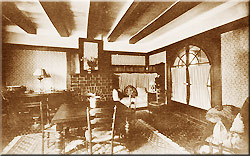 Le Sécadou – Dining room |
Addo Martin Berenger
bought and enlarged the family country house of Sécadou where Émile spent his childhood. |
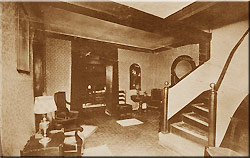 Le Sécadou – Hall |
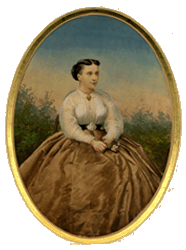 Mélanie RIPERT born BERENGER 1845-1924 |
In 1877, Mélanie married Adrien Ripert, then a lawyer in Draguignan and then in Aix.
|
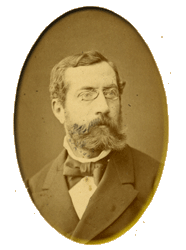 Adrien RIPERT 1843-1922 |
The 3 brothers have always lived in perfect harmony spending their holidays together, maintaining regular correspondence and their parents have managed to maintain an admirable union between them. Henri, born in 1878, auditor at the Council of State, died young without having had time to climb the career that his beginnings promised. Georges, born in 1880, was professor and dean of the Paris law faculty, member of the Institute and author of numerous law books. Émile, born in 1882, very early on felt the soul of a poet.
Émile spent the first years of his life in Draguignan where his father was admitted, but it was in La Ciotat that the whole family spent the school holidays in the old family country house of Sécadou. It was there that he soaked up the atmosphere of his land and his city. It was there that he experienced his first poetic emotions. It is this rooting that gave him a filial cult for Provence and for his city.
|
|
He was not yet 12 years old when he enjoyed writing verses which he published in high school in a little school newspaper he had founded called the arrow which he mimeographed in Father’s Study.
This is how the child-poet awoke to life and felt his feelings and his heart form in that wonderful combination of Italy and France that is Provence. On January 17, 1895, Émile won what he called his first “jacket”, during an oral test of French composition, with his bicycle as responsible, the poetic account of the anecdote can be seen here |
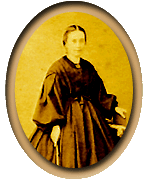 Elvire BERENGER 1824-1905 |
He lived in rue Claude Bernard and his aunt Elvire had agreed to leave Marseille to spare him boarding school. His older brother Henri had accompanied him to prepare for the Council of State.
His aunt Elvira was to die the year Émile finished his studies, as if his task was over. Emile will later dedicate to hi He made superior rhetoric at Henry IV high school. It was there, in an atmosphere charged with poetry, that he was introduced to contemporary poetry, that of Rimbaud, Mallarmé, Henri de Reignier and all the Symbolists. But he was very fond of Parnassians like Leconte de Lisle, Sully Prud’homme or François Coppée. He won several prizes in the general competition and was admitted to the École Normale Supérieure in 1901. He continued to rhyme during his studies and he was eager to publish his verses in good conditions. |
At the turn of the century, we were in Paris in the effervescence of the theatrical works of Edmond Rostand, who was then in all his glory.
Thus began the great meetings of Emile the poet with Frédéric Mistral in 1901 and Edmond Rostand in 1902![]()
|
The intellectual discipline that school gave him, the interest that a deep knowledge of literature could provide, could not make him forget his native land. One day, while walking through the streets of Paris, he stops in front of a second-hand bookstore and sees a little brochure on Provence. He buys it, and there is enlightenment. He discovers in him this passion which will be the one that will dominate all his life. Here is how he recounts this “revelation”: “In my Parisian exile I had one rainy and bored day discovered Provençal poetry, which no one in Provence, neither in high school, nor in family had ever told me about. Yes, as I was strolling one day in the galleries of the Odéon, I unearthed a 10 centime brochure from the Blériot et Gautier bookstore; this humble booklet composed by the poet Paul Marieton, under its gray cover, contained a few luminous poems by Mistral, Roumanille, Aubanel, and Félix Gras. Suddenly reading them the fog that enveloped me cleared; to the sound rhythm of a language, of which I knew a few words and which I knew instinctively how to pronounce correctly, I had the revelation of a poetic universe, which for me eclipsed that of the Romantics, the Parnassians and the few Symbolists to whom I thought I had to initiate myself. From then on I remembered that my paternal grandfather was an old feliberate, though resigned to the disappearance of the ancient language, which he had never spoken to me about. But I remembered that as a child I looked in his library, rue des Beaux Arts in Marseille, the spine of a book with a strange title that had stuck in my mind, Mirèio, written by hand on a notarial label. I wrote to my grandfather, got me the little Félibrige Treasure recently edited by Father Xavier de Fourvières, and read Mirèio, without spending the sum of 3 francs for its purchase, which is considerable for my schoolchildren’s purse, j ‘was going to shut myself up in the Sainte Geneviève library, where in the smell of wet umbrellas, old books from more or less grimy readers, in the sound of footsteps and turned pages, I inhaled all the perfumes of the Alpilles and I listened to the magnanarelles sing. “
At the Normal School where I entered shortly after, I brought a vocation as a Provencalist; I dared to admit it; the librarian, Lucien Herr, smiled at this sweet mania, brought for my use from Germany the annotated edition which the learned Koschwitz had just given of Mireio. My good Master, M. Joseph Bedier, said to me: “Do you want to make Provençal?” Do you know German? ” All of them oriented me towards Roman philology and troubadours, while only Mistral and his Félibres for the moment interested me.
Although absorbed by his studies, his vocation began to take shape and he now felt a burning desire to meet the one who was to be his guide and his teacher: Frédéric Mistral. The one who “to plow the field of poetry, found rusty in the paternal fields, the old araire of yesteryear …”
|
| When he left school in 1905, Émile had to do a year of military service at Digne in the so-called dispensed peloton.
He was as little soldier as possible and we had to give up making him a reserve officer. |
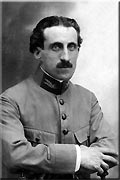 Émile RIPERT soldier 1882-1948 |
In 1907, Emile’s career as a teacher began, first appointed to the Lycée de Toulon. ![]()
That same year he visited Rome,![]() Assisi, Florence, Naples, Genoa, Bologna, Venice and he thus spent 5 months in Italy in a lyrical enchantment and enthusiasm. It was in Florence that he reread the Divine Comedy in the text and it was there on the banks of the Arno that he discovered the mold in which most of his poetic work was to flow, the “terra- rima ”by Dante.
Assisi, Florence, Naples, Genoa, Bologna, Venice and he thus spent 5 months in Italy in a lyrical enchantment and enthusiasm. It was in Florence that he reread the Divine Comedy in the text and it was there on the banks of the Arno that he discovered the mold in which most of his poetic work was to flow, the “terra- rima ”by Dante.
It was at this time that he published La Terre des Lauriers which received the national poetry prize which brought him success and confirmed his reputation as a poet.
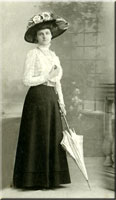 Adrienne RIPERT née GRAS 1886-1970 |
He married on April 25, 1908 Adrienne GRAS, the daughter of Doctor Gras who had been mayor of La Ciotat. She was a childhood friend to him and he dedicated many verses to her. In 1904, he dedicated his first collection of poems to him, “le chemin Blanc”.
Two children were born from this marriage: Francis born in 1911 and Mireille born in 1914 who died at the age of 15. He wrote for her a collection of poems “ |
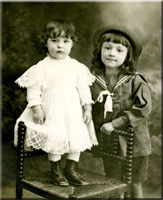 Francis RIPERT 1911-1997 Mireille RIPERT 1914-1930 |
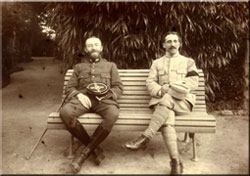 Émile RIPERT on the right and a friend of Emile – 1916 |
In 1914 he was then affected by the decree of mobilization as a colonial infantry sergeant.
He will be appointed stewardship attaché in Carcassonne and then in Oran. |
The war stopped Emile’s efforts. Like everyone else, he returned, very weary, his poet’s wings almost consumed in the great furnace. It was then that he wrote “The Wounded Mermaid”, a poem about submarine warfare, which is like a monument raised to the fallen of the Great War.
Released, he returned to the Lycée de Marseille in rhetoric class and in this interval he defended his thesis at the Sorbonne. He became a Doctor of Letters at the Sorbonne in 1916 during the war, by defending his thesis entitled “the Renaissance Provençale” accompanied by the complementary thesis “the versification of Mistral”. This book is the most comprehensive study that has been done on the literary movements of the South of France from the Troubadours to the Felibré movement. This thesis was crowned by the Académie Française.
From 1920 he brilliantly occupied the chair of professor of Provençal literature and language at the Faculty of Letters of Aix en Provence. It was then that the man of letters really took off.
In 1923 he began an uninterrupted series ofremarkable conferencesnot only in all regions of France, but also in neighboring nations such as: Italy, Germany, Spain, Romania, the Grand Duchy of Luxembourg, the England, or Monaco. ![]()
TO BE CONTINUED…
|
Links to pages including animation are announced by the flash logo: |
